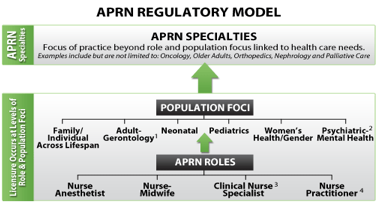Over the past few years, graduate oncology specific nursing education across the county has undergone some dramatic and controversial changes. In 2008 the Consensus Model of APRN Regulation: Licensure, Accreditation, Certification, and Education (LACE) was published by the National Organization of Nurse Practitioner Faculty (NONPF). It recommended that Advanced Practice Registered Nurses (APRNs) be educated for a specific role (e.g. nurse practitioner, clinical nurse specialist) with a specific population focus (e.g. Adult-Gerontology, Psychiatric-Mental Health, Women’s Health). These recommendations ultimately were broadly accepted, resulting in substantial changes in eligibility criteria for national certification examinations and licensure.
Oncology nursing was not classified as a population focus but rather as a specialty. In order to meet the revised criteria for population focused certification and licensure, students enrolled in graduate oncology nursing programs would have to complete a markedly increased number of “population based” clinical hours and course work. This would result in a further increase in the amount of time required to complete graduate oncology programs, as well increase cost of these programs and were largely unsustainable. One of the unfortunate consequences of LACE was that graduate oncology nursing programs across the country either closed or started to offer an abbreviated curriculum as a concentration or minor. The Oncology Nursing Society (ONS) maintains a list of these programs and has expanded its continuing education offerings.
Oncology nurses and their leadership, including ONS, expressed alarm regarding the impact that the resulting loss of formal graduate oncology nursing education would have on patient care and the profession. As a leading cause of death in adults, and a significant cause of disease and treatment related morbidity, cancer is a major national health problem. With our aging population, the incidence and prevalence of cancer is expected to further increase. Our understanding of the underlying biology and genetics of cancer is rapidly expanding, resulting in constantly changing treatment options and supportive care interventions. Robust oncology nursing research has led to improved supportive care for countless patients and positively affecting numerous outcomes. Coinciding with these changes in APRN regulation was a growing recognition that oncology APRNs would hold a pivotal role in addressing a widening gap between demand for oncology services and availability of oncologists. Consequently, it is critical that advanced practice registered nurses (APRN) be well prepared to deliver comprehensive, evidence based care to patients and families along the cancer continuum in a variety of health care, community, and home settings.
One Program’s Experience
For the past three decades, The University of Pennsylvania School of Nursing has had a robust academic oncology APRN program that has evolved to meet the needs of future clinicians, educators, leaders, and researchers. Penn remains committed to continuously educate excellent APRNs in a changing health care environment. To align with the consensus model, Penn’s oncology APRN program was modified into the Adult Oncology Specialty Minor/Post Masters Certificate. Its curricula is based on the Oncology Nursing Society (ONS) competencies for oncology nurse practitioners and clinical nurse specialists and prepares nurses for either the Advanced Oncology Certified Nurse Practitioner (AOCNP) or the Advanced Oncology Certified Clinical Nurse Specialist (AOCNS) examination provided by the Oncology Nursing Certification Corporation (ONCC).
This program is designed for current graduate nursing students and practicing masters prepared nurses who desire advanced academic preparation in oncology nursing. As part of the requirements for the minor or post masters certificate, students must complete three courses and acquire clinical experience as well. Post-MSN students will submit a portfolio to determine if clinical experiences will be required. The curriculum is also appropriate for students enrolled in non-clinical programs (e.g. nursing administration) that would benefit from this content. These students would not have a required clinical experience. The faculty has extensive experience in oncology nursing, and students interact with nationally recognized scientists and clinicians in the field of cancer care from the University of Pennsylvania School of Nursing and the University of Pennsylvania Health System, Abramson Cancer Center.
Starting in the fall of 2013 the Adult Oncology Specialty Minor/Post Masters Certificate will be available in an exciting on-line format! This will allow students and clinicians to more conveniently meet their oncology specific educational needs. The didactic will be provided in synchronous and asynchronous sessions. Clinical experiences for clinically focused students can be done close to their home. Students will only need to come to the Penn campus twice over the course of their studies for stimulating seminars, high fidelity simulations, and networking with experts in the field of oncology and nursing. More information about the program is available on the Penn SON website.
Questions for the Future
As we move forward, it is important for nursing programs, professional organizations such as the Oncology Nursing Society, and employers throughout the country to examine how they will meet the needs of current and future oncology APRNs. They will need to address a multitude of questions including:
- How to integrate oncology APRN competencies into comprehensive, high quality graduate oncology nursing programs in flexible, efficient, and cost effective manner?
- How to obtain funding for the development of these programs?
- How to maintain a substantial cohort of oncology expert faculty in academic institutions?
- What financial aid sources are available to assist students in paying the tuition for these programs?
- Should APRNs practicing in oncology be required to obtain national APRN oncology certification (AOCNP, AOCNS)?
- How to continue the clinical education and professional development of graduates in their places of employment through competency based orientations or fellowships?
- How to sustain ongoing development of strong oncology nursing leadership and research?

